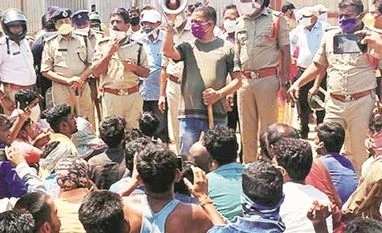In an indication that the nationwide lockdown could be relaxed in some respects after May 3, the government on Wednesday amended its earlier guidelines to allow inter-state movements of people — of stranded migrant workers, students, pilgrims, tourists, and others.
The Union home ministry on Wednesday evening said the new lockdown guidelines, which would come into effect on May 4, would give “considerable relaxations to many districts”.
The ministry said it held on Wednesday a comprehensive review meeting on the lockdown. There have been “tremendous gains and improvement in the situation due to lockdown till now”.
It appealed to people to strictly observe the lockdown guidelines until May 3 to ensure that these gains were not frittered away. “New guidelines to fight Covid-19 will come into effect from May 4, which shall give considerable relaxations to many districts. Details regarding this shall be communicated in the days to come,” the MHA tweeted.
The move may lead to further concerns by industry, which had flagged shortage of labour as a problem and had offered help to bring workers back to factories as additional economic activities were planned to start from April 20.
Bihar Chief Minister Nitish Kumar welcomed the new guidelines as a “positive decision”, which would help migrants, students, and others from Bihar to return home.
Delhi Chief Minister Arvind Kejriwal said his government would discuss movements of migrants with other states, and inform people in a day or two. He requested people to stay in their homes and follow the lockdown guidelines.
It wasn’t as if people didn’t travel across states during the last 35 days of the lockdown since it was enforced on March 25.
Since the government had expressly banned inter-state transit, hundreds of thousands were forced to walk, and some even cycled hundreds of kilometres to reach their homes.
The Union home secretary’s amended guidelines allowed inter-state movements only by road. Train and air services will continue to remain shut.
Migrant labourers were left in limbo when India was locked down.
The order, however, did not specify whether a person or a family could travel in a private vehicle, and, if allowed, under what conditions.
Wednesday’s notification is a major reversal of a decision issued 10 days ago, when the ministry had said workers stranded in relief camps could go to work within the states they were in but not to their home states because inter-state movement was not allowed.
However, in recent days some state governments, including Bharatiya Janata Party-ruled (BJP-ruled) Uttar Pradesh and Gujarat, circumvented the earlier guidelines of the Centre to evacuate their students and migrant workers in buses from other states.
Days after the lockdown was enforced, hundreds of thousands of migrants began their journey from cities to their villages on foot. Workers, 500,000-600,000 in number, are estimated to have walked back home, according to official figures.
Shelters were set up to accommodate them to ensure that they did not leave. There are around 1.04 million workers residing in 26,476 relief camps, the Central government told the Supreme Court recently.
The government had said the migrant workers residing in relief camps should be registered with the local authorities “and their skill mapping be carried out to find out their suitability for various kinds of works”.
Under the new guidelines, all states and Union Territories (UTs) have been asked to designate nodal authorities and develop protocols to receive and send migrants, students, and other such persons. The nodal authorities will also register such persons stranded in their states/UTs.
States need to consult one another on movement by road. Those travelling will be screened. Only asymptomatic persons will be allowed to travel.
States have been asked to arrange for buses. These need to be sanitised and safe social-distancing norms need to be followed in them.
The states on the transit route would allow such people to move. On arrival at their destinations, these persons will be put in home quarantine unless their health requires keeping them in institutional quarantine. They will also need to install the AarogyaSetu App on their phones.
At the chief ministers’ meeting with Prime Minister Narendra Modi on Monday, Kumar had demanded that the earlier guidelines be amended.
Kumar bemoaned how some states had ignored the guidelines and transported migrants and students from other states, but said Bihar would not be able to transport its students and migrants from across India if the guidelines were not amended.
Rajasthan Chief Minister Ashok Gehlot recommended a uniform national policy on the transit of migrants and students.
Thousands of students from across India study in Rajasthan’s Kota, and states like Chhattisgarh and others have sent buses to evacuate them.
In recent days, Uttar Pradesh, Chhattisgarh, Gujarat, Odisha, Maharashtra, Punjab, and some other states have consulted one another to facilitate evacuation of their students, migrant workers, and pilgrims.
Until Monday, UP evacuated 12,000 of its migrant workers from Haryana.
There were at least three protests in recent weeks by migrant workers in Surat because they were not able to go back to their states.
About a fortnight ago, a few hundred people had also gathered in Bandra, Mumbai, after rumours spread that trains would ply.
Unlock 30+ premium stories daily hand-picked by our editors, across devices on browser and app.
Pick your 5 favourite companies, get a daily email with all news updates on them.
Full access to our intuitive epaper - clip, save, share articles from any device; newspaper archives from 2006.
Preferential invites to Business Standard events.
Curated newsletters on markets, personal finance, policy & politics, start-ups, technology, and more.
)